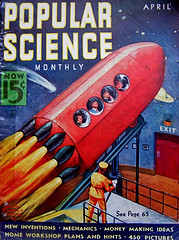We will be unprepared, we will be uncomfortable
As 2012 winds down its final days, (we finally may even see some snow here in Western NY, and by the way, what has happened to Winter?), it is pretty common and natural to start thinking past the holidays and celebrations and look ahead, just a little bit, to the future. For most of us, 'planning' consists of at the organizational level preparing a set of 1 or 2 or 5 year forecasts for basic metrics like revenue, profit, headcount, locations, etc. And in our personal development, plans (such as they are), often involve attaining that next step on an existing career path, achieving additional expertise or certifications, and maybe even some non-work goals like getting into better shape, or seeing the Taj Mahal. In both contexts, organizational and personal, these exercises are necessary and sometimes even helpful, but they are certainly kind of routine and often fail to adequately prepare our organizations and ourselves for radical or disruptive change that we know is coming, but we think we lack the framework or capacity to plan for.
for radical or disruptive change that we know is coming, but we think we lack the framework or capacity to plan for.
Recently Google made news with the hiring of prominent 'futurist' Ray Kurzweil, who is most noted for his prediction that by 2045 human and machine intelligences will merge into something he calls the 'singularity', a state whereby superhuman machine intelligences and people will co-exist in a previously unimagined state of being. Other firms besides Google have engaged futurists as well, and some commentators like this one quoted in Business Insider, recommend that every corporation needs a futurist.
I think the key reason for organizations to spend a little bit of time, if not actually engaging a 'futurist', but at least thinking expansively and creatively about the future are best summarized in the BI piece from Peter Bishop:
"There will be significant change within our tenure within any position within our lifetime for sure, that we will have to learn to live in a new world — to some extent. It's not completely new the way some futurists will say. But it will be new enough that we will be uncomfortable, we will be unprepared, and that we will have to learn new skills and new techniques in order to be successful in that future compared to how we are being successful today, or indeed how we were prepared to be successful when we were in school or training."
What are some of the wild, speculative types of questions you should consider asking as you think about next year and beyond?
What if the levees don't hold, i.e., what if some remarkable external action or event renders us unable to operate?
What if our largest competitor starts giving away the product/service that accounts for 64% of our sales?
What will we do if the CEO, CFO, C-insert-any-letter-you-like-here-O resigns unexpectedly? And goes to our most-hated competitor?
What if our VP of Marketing approves a TV commercial that is so off-key that our Facebook page and Twitter feed are inundated with outraged customers?
What if Kurzweil is right, and machine technology advances incredibly quickly, making existing ideas about manufacturing, distribution, and marketing mostly obsolete?
I don't think that any credible 'futurist' or any forward-looking and curious Talent pro like you can credibly get away with endless blue-sky postulating on some of these really unlikely or fantastic scenarios. But, I do think it worthwhile to carve out just a little planning time and energy, (10%, 5%, maybe even 2%), thinking about the future not just as an incremental extension of the present, but as a potential wildly and radically different environment from today.
While you might not want to get a reputation in the office as the 'Kurzweil' or out of touch dreamer, I would also submit you don't want to be known as the 'status quo' person.
We KNOW things will change. It's (part) of your job I think to figure out what.
Happy speculating.

 Steve
Steve
Reader Comments